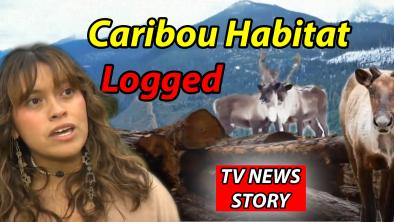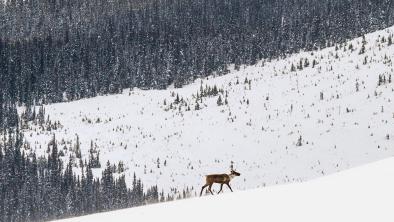Debate over the decline of caribou in Wells Gray
Sun Peaks independent news

Tension is growing between environmentalists and other groups over logging practices and the decline of caribou populations across B.C., including in the Wells Gray region north of Sun Peaks.
The Wilderness Committee, a non-profit environmentalist organization, said deforestation of core critical habitat to the southern mountain caribou is the primary driver of the species’ declining numbers, as it takes away important food sources and increases their predation by wolves.
In September, they discovered, alongside the Wildlife Defence League, about 500 football fields worth of clear cut in Wells Gray that overlapped with areas designated by the federal government as core critical habitat for southern mountain caribou, according to Charlotte Dawe, spokesperson for the Wilderness Committee.
The Wilderness Committee and other environmentalist groups are advocating for changes that would better protect provincially mapped critical habitat by making it completely off-limits to investor activity.
In Canada, southern mountain caribou are protected as a threatened species under the federal Species at Risk Act, however it’s the prerogative of the provincial government, on whose lands the caribou reside, to implement protection measures.
In September, B.C.’s Forests Minister Doug Donaldson told Black Press Media that additional habitat protection for the southern mountain caribou was not needed.
“Our analysts are looking around at the other herds that need to be protected in the province, and they feel that we have enough habitat protection measures in place,” he said.
Donaldson went on to pose increased wolf culling as a solution to the issue instead.
In response, on Oct. 9, the Wilderness Committee and 22 other signatories petitioned the B.C. Premier and federal Environment Minister to enforce the Species at Risk Act.
They called on them to increase habitat protection for the Southern Group of southern mountain caribou which would allow Ottawa to take over control of provincial land, including over the granting of logging permits.
However Black Press media reported some communities in the Kootenay and Cariboo regions will resist restrictions on logging brought about by proposed caribou protection strategies.
Some fear any restrictions will lead to job cuts in the industry and expanded recreational no-go zones with limitations on snowmobile and ATV use in the backcountry.
When reached for comment local pulp mill Canfor spokesperson Michelle Ward said they look for balance.
“We recognize the need to take measures to protect caribou and believe a science-based approach that also considers socioeconomic impacts should always be used.”
The B.C. Council of Forest Industries released a report in 2018 which stated caribou recovery is predicated on much more than habitat preservation.
It noted that declining caribou populations exist in already protected areas, like Wells Gray Provincial Park, and other areas that have never had any industrial activity, and proposed a multi-species and ecosystem-based approach that supported biodiversity, rather than focusing exclusively on caribou.
Evidently, with many factors and stakeholders at play, there may not be a simple solution to the conservation of the southern mountain caribou.
Click here to read the original article published by Sun Peaks News.


